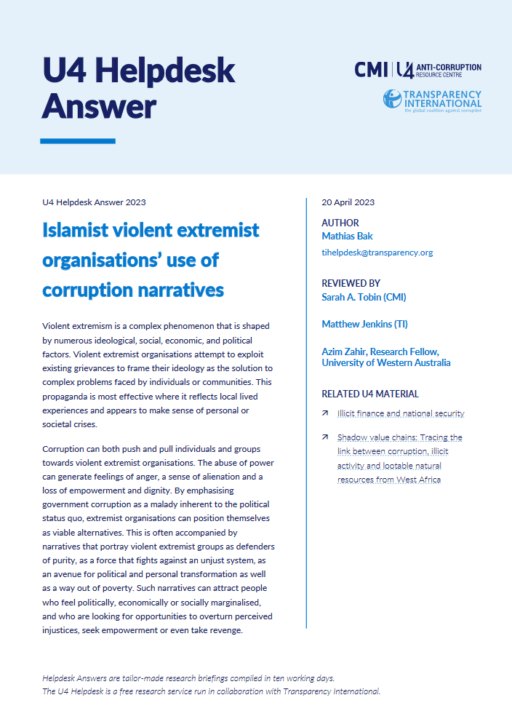- Home
- Anti-Corruption Helpdesk
- Islamist violent extremist organisations’ use of corruption narratives
Islamist violent extremist organisations’ use of corruption narratives

This Anti-Corruption Helpdesk brief was produced in response to a query from a U4 Partner Agency. The U4 Helpdesk is operated by Transparency International in collaboration with the U4 Anti-Corruption Resource Centre based at the Chr. Michelsen Institute.
Query
Please provide an overview of how Islamist violent extremist organisations deploy narratives of corruption to assist their recruitment efforts.
Summary
Violent extremism is a complex phenomenon that is shaped by numerous ideological, social, economic, and political factors. Violent extremist organisations attempt to exploit existing grievances to frame their ideology as the solution to complex problems faced by individuals or communities. This propaganda is most effective where it reflects local lived experiences and appears to make sense of personal or societal crises.
Corruption can both push and pull individuals and groups towards violent extremist organisations. The abuse of power can generate feelings of anger, a sense of alienation and a loss of empowerment and dignity. By emphasising government corruption as a malady inherent to the political status quo, extremist organisations can position themselves as viable alternatives. This is often accompanied by narratives that portray violent extremist groups as defenders of purity, as a force that fights against an unjust system, as an avenue for political and personal transformation as well as a way out of poverty. Such narratives can attract people who feel politically, economically or socially marginalised, and who are looking for opportunities to overturn perceived injustices, seek empowerment or even take revenge.
Contents
- Introduction
- How Islamist violent extremist organisations have used narratives of corruption
- ISIS
- The Taliban
- Al-Shabaab
- Boko Haram
- Corruption-related push and pull factors contributing to violent extremism
- Conclusion
- References
Main points
- Recruitment by Islamist violent extremist organisations can draw on ideological factors (such as the notion that Islam is a complete and pure political, social and economic system) as well as concrete social, political and/or economic issues.
- Islamist violent extremism offers a radically different vision of society, which can be attractive to some people who desire a recasting of the socio-political order.
- Perceived corruption – often understood more broadly as injustice or ungodliness by the populace – can play a significant role in increasing dissatisfaction with existing governance structures.
- In practice, corruption – in the sense of the abuse of entrusted power for private gain – also fuels many of the forms of misrule and maladministration that leave groups and individuals more susceptible to the revolutionary messages of violent extremist organisations.
- Violent extremists often tailor their messages to local conditions and individual predicaments to exploit people’s underlying grievances. These material grievances tend to be at least as important as ideological factors.
Caveat
This Helpdesk Answer considers the use of corruption narratives by Islamist extremist organisations. Violent extremist groups – either Islamist or non-Islamist - are present in most societies around the world, intersecting in complex ways with philosophies on both the left and right of politics. Many non-Islamist violent extremists also deploy narratives of corruption to recruit followers.
The ideological development of Islamist violent extremism is complex and charting its trajectory falls beyond the scope of this Helpdesk Answer. The purpose of this paper is to provide an overview of how Islamist violent extremist organisations use narratives related to government corruption in their propaganda and recruitment practices.
This paper is the first of a two-part series of Helpdesk Answers on corruption and violent extremism. The second paper considers how anti-corruption measures can contribute to preventing and countering violent extremism (P/CVE).
Authors
Mathias Bak, [email protected]
Reviewers
Sarah A. Tobin (CMI)
Matthew Jenkins (TI)
Azim Zahir, Research Fellow, University of Western Australia
Date
21/06/2023

